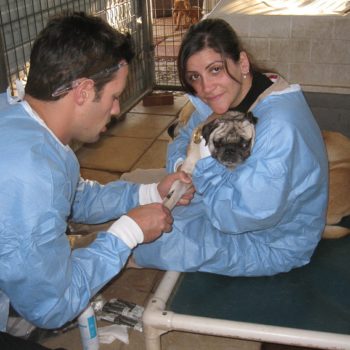The unprecedented animal lifesaving we see sweeping the country today came about hand in hand with the rise of shelter medicine. Richard Avanzino, the first president of Maddie’s Fund® and the man widely considered the “godfather of the no-kill movement,” reflected a decade ago on the role of the veterinarian in animal sheltering. Here is an updated commentary ten years down the road.
[T]he study of shelter medicine in veterinary colleges consists of small animal population health management with an emphasis on infectious disease control and prevention. Other aspects covered by shelter medicine courses include individual animal care, behavior assessment and environmental enrichment. Related areas include surgery, cruelty investigation, forensics, facility design and shelter management.
As encompassing as shelter medicine is, however, veterinarians in many shelters are still tasked almost exclusively with spay/neuter surgeries, bringing us to a new watershed issue: What is the role of the veterinarian in today’s animal shelter?
[…]
Veterinarians in animal shelters shouldn’t be tucked away in surgery suites doing nothing but neutering. They should be writing policies and protocols for vet techs, kennel attendants, adoption counselors and volunteers. They should be providing wellness programs for the healthy, directing treatment or rehabilitation plans for the sick, and performing corrective surgery on animals in need. They should be out on the floor to see that animals are properly housed. They should make sure that cleaning, handling, vaccination and quarantine protocols are followed, and they should ensure that behavioral needs (rehabilitation, enrichment, exercise, companionship) are met.
A shelter veterinarian should constantly scrutinize the overall well being of the shelter’s animals. If a veterinarian spots deficiencies that put an animal’s physical or mental health at risk, it is the veterinarian’s responsibility to report that to the shelter administrator and to recommend changes. They may not have the authority to make the changes in all cases, but as the shelter’s medical expert, the veterinarian’s opinion should be very carefully considered, just as one would listen to legal counsel or to the chief financial officer in corporate America.
To some, especially to the new breed of shelter veterinarians, this sounds obvious and so elementary it’s barely worth mentioning. And yet, it’s disappointing to hear that many shelter directors still don’t give veterinarians adequate responsibility and authority to protect and provide for the health of the shelter animals. Periodically we hear horror stories about shelters where animals are suffering in terrible conditions even though a full-time veterinarian is on staff. Either the doctor can’t or won’t step in because they are relegated to spay/neuter surgery, or when they do try to advocate for the animals, their opinions and suggestions are ignored.
This not only should change, it must and will change.

